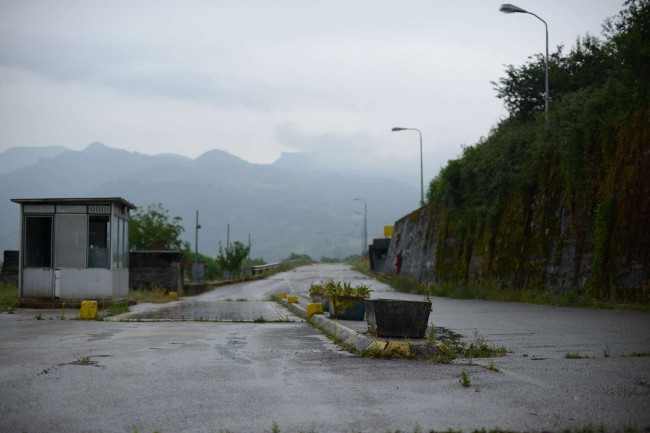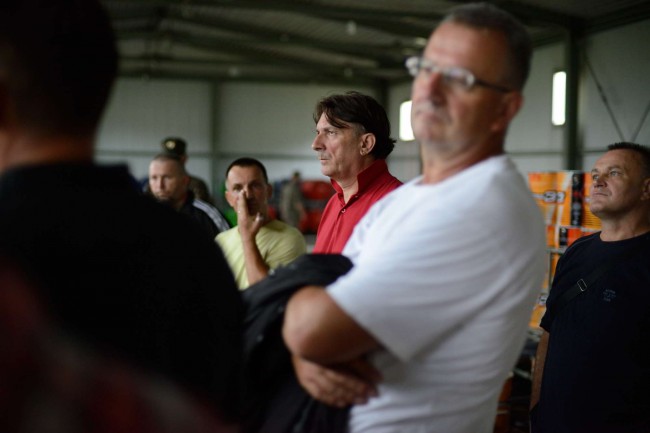Thinking that we needed to bring together the group of war veterans from the region with whom we cooperate in peacebuilding and dealing with the past, in order to exchange experience about our past activities and plan next steps, we decided to augment the working part of the meeting with more socialising and recreational activities. We also wanted an environment that would allow us an escape from the workshop part of the meeting dealing with the difficult wartime past into a sphere of relaxation and empowerment for new endeavours. We wanted a place that offered a pleasant stay, but also had an important role in the historical context of the region. We settled on Konjic.
We gathered in this town on 22 July, at the Garden City hotel so that we could start working the next day. Our intention had been to form a larger group, but due to many cancellations, there was a total of us twenty – peace activists and war-veterans from Serbia, Croatia and BiH. We divided the schedule of the war veterans meeting into the morning working part and the afternoon that included visiting local sites important in the context of dealing with the past and informal socialising at nearby recreational sites.

During the morning of the first day, we reviewed our joint actions and activities organised by war veterans in cooperation with CNA in the past year. We discussed how the presence of a mixed group of veterans was seen when we would attend official events, commemorations, when we would come to sites of suffering and memory, who supported us and how, but also what problems and difficulties we faced. We also talked about how media coverage of our activities and TV appearances by the veterans contributed to our peace work being recognised, how they affected us and our communities. We concluded that each event enriched us, that we learned many new things and that all these experiences will be useful in the future, because we have been inspired to continue with our actions.
Moving on, the war-veterans presented their work in peacebuilding and activities within other peace initiatives, citing examples of dialogue between war veterans and young people in schools in Republika Srpska, multi-ethnic dialogue involving administrative and education staff in municipalities from the Federation of BiH and Republika Srpska.
Discussing current political events and their impact on out and our environment, we started with a brief overview of the events in the past few months. We focused in particular on conflicts around the marking of twenty years since the genocide in Srebrenica and the commemoration of victims of Operation Storm, as well as other events that have lead to an atmosphere of constant tensions, mutual accusations and threats. Within such a context of fear, hurt and insecurity about the appropriate way to remember the war, the gathered group confirmed its determination in peacebuilding to recognise and respect all victims of war, condemn all crimes and insist that all perpetrators of war crimes should be prosecuted and convicted.

In the afternoons of our stay in Konjic, we visited the barracks in Čelebići which in 1992 was the site of a detention camp administrated by the Army of BiH and the municipal authorities for captured Serb civilians and soldiers. Reading parts of the judgements for war crimes, we learned about the horrific scenarios that played out in this camp, where the conditions themselves constituted a crime, not to mention the torture, killings and the most atrocious slaughter. We went there on a rainy, relatively cool summer day, but still it was difficult to breathe in the ‘hangar’. To imagine what it must have been like under a scorching sun, while a few hundred people are crowded inside brings to mind images of hell. Horrific, perhaps even unimaginable. The site of the detention cam is still unmarked, though there are initiatives to mark it. We hope the powers that be will one day run out of excuses for not doing so.
After seeing the detention camp, we set off to Jahorina[1], where on 24 July, we continued our work.
In the meantime, we were joined by Edin Ramulić from the Izvor Association of Prijedor Women, himself also a war-veteran. Edin introduced us to the concept of memorialisation in Prijedor and the activities his organisation has been involved in, after which we discussed the possibilities for organising peace actions in this town where our group could participate. These questions remain open, but the proposals included the possibility of a joint visit by war-veterans and organising a public discussion with war-veterans.
The rest of the workshop was devoted to discussing ideas and plans for future joint actions, where we focused on the need to expand our existing activities of visiting sites of suffering and attending official commemorations to areas where we have not been present to date. The war-veterans expressed a high degree of motivation and readiness to engage independently in establishing contacts that would make this expansion possible. At the same time, we also focused on strengthening and improving existing cooperation with veterans organisations in places where we had not been active to date.
We also considered ideas for projects that would bring together war-veterans and CNA activists to present our cooperation to the public, which was a need and wish expressed by the group. One such idea was the development of a virtual joint memorial with stories and photographs of war-veterans that would contain original testimony from war-veterans that subsequently became peacebuilders.
This meeting resulted in a lot of exchanges of opinions and productive dialogue. The war-veterans inspired each other and demonstrated a high degree of motivation for working on peacebuilding, which contributed to an empowering atmosphere and encouraged us to take next steps.
We spent the afternoon walking on the mountain paths of Jahorina, known from time immemorial as a ‘beauty among mountains’ and spent the rest of the day in pleasant informal socialising.
[1] During the morning workshop we had made a joint decision to leave the Garden City Hotel in Konjic. We did so due to the very unprofessional conduct of the staff and owner of the hotel with respect to our arrangement, but also towards us as guests.